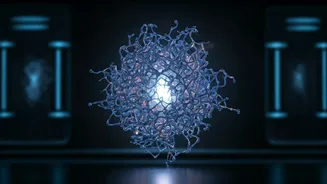AI's Drug Discovery Role
The conventional method for discovering new drugs has always been a protracted, resource-intensive undertaking. Typically, it takes about 10–15 years and
billions of dollars to bring a single drug to market. The process is characterized by a series of time-consuming experiments, laboratory tests, and clinical trials. However, artificial intelligence is now poised to fundamentally alter this paradigm. AI algorithms can analyze vast datasets, simulate molecular interactions, and forecast the efficacy of drug candidates with remarkable accuracy. As a result, the drug discovery process can be greatly accelerated, enabling the pharmaceutical industry to introduce life-saving medications to patients much sooner. AI's ability to identify potential drug targets, predict drug effectiveness, and accelerate clinical trials is driving a new wave of innovation in healthcare.
Protein Mapping Breakthroughs
Central to AI's impact on drug discovery is the capacity to map proteins. Proteins are the key molecules within the body and are vital for almost every biological process. Their complicated structure and intricate interactions make them prime targets for therapeutic intervention. AI-powered protein mapping entails the development of sophisticated algorithms capable of deciphering the structure and function of proteins. This is achieved through analysis of massive datasets of genetic and chemical information. Using machine learning and advanced computational techniques, scientists can visualize proteins' interactions and predict how they interact with potential drug molecules. The creation of such detailed protein maps will allow scientists to zero in on specific regions of proteins, making it easier to develop targeted drugs with reduced side effects and increased efficacy. This approach speeds up the process of finding new drug candidates and paves the way for a more targeted and effective approach to treating illnesses.
Future of Healthcare
The integration of AI into drug discovery heralds a revolutionary change in healthcare. As AI-powered protein mapping becomes more refined, the speed and accuracy with which drug candidates are identified will greatly improve. This will result in a decrease in the cost and time involved in creating new drugs. Additionally, AI can contribute to creating personalized medicine. By analyzing an individual's genetic makeup, AI can help tailor treatments to their particular needs, enhancing therapeutic effectiveness while minimizing side effects. This shift toward precision medicine will provide better outcomes for patients and offer a paradigm shift for how diseases are treated. The advancements made through AI in drug discovery point to a future where medical treatments are more effective, personalized, and accessible for everyone.














